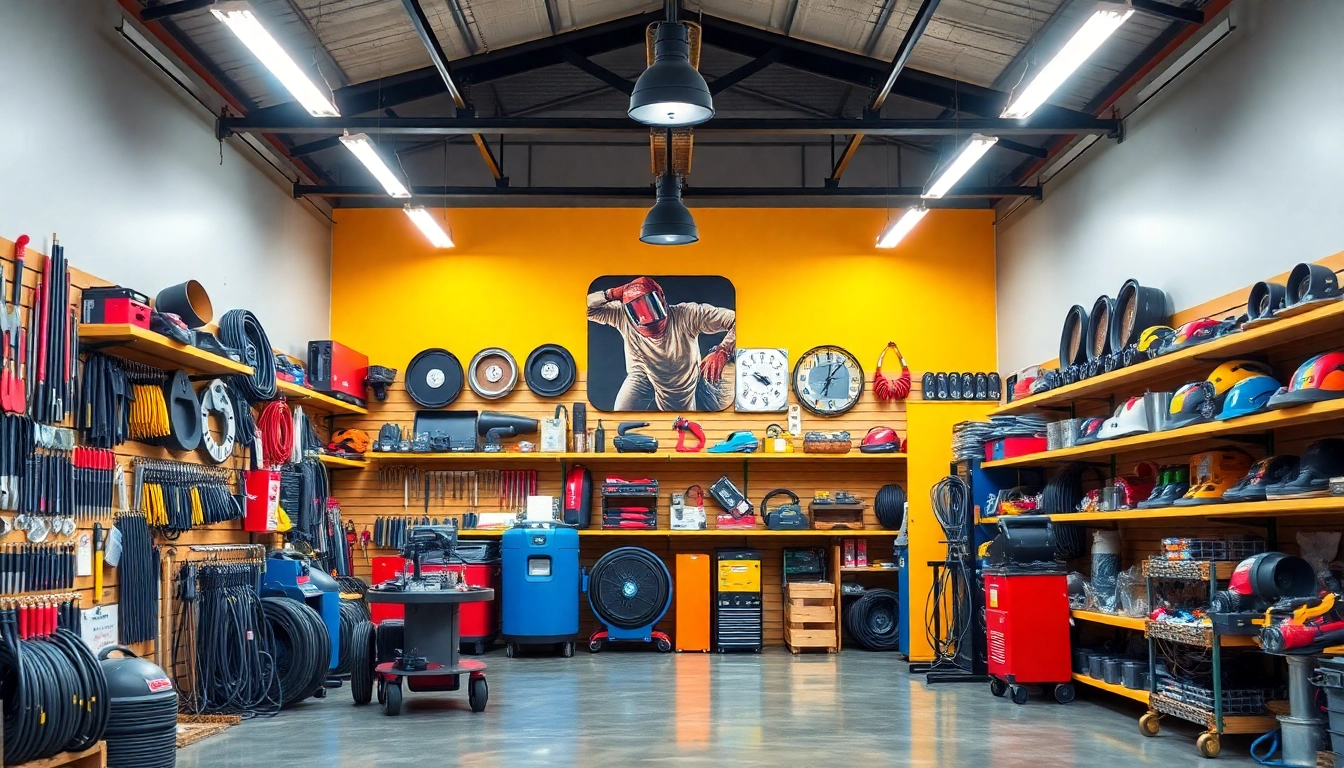
1. Understanding Welding Supplies and Their Importance
When embarking on any welding project, having the right supplies and equipment at your disposal is crucial. Welding supplies encompass a wide range of items that facilitate the welding process, ensuring that the work is completed efficiently and safely. From welding machines to protective gear, understanding what constitutes these supplies can significantly impact the quality of your work.
1.1 What Are Welding Supplies?
Welding supplies include all the equipment and materials needed to properly perform welding tasks. This can range from welding machines, filler metals, and welding rods to protective gear, welding helmets, and safety clothing. Each item is specifically designed to aid welders in creating strong, durable welds while ensuring their safety.
1.2 Types of Welding Supplies Available
- Welding Machines: Equipment that generates the heat needed to melt metal.
- Welding Rods: Filler material that helps in bonding metals.
- Gas Cylinders: Containers that store gases essential for various welding processes.
- Protective Gear: Safety helmets, gloves, and aprons that protect welders from hazardous conditions.
- Welding Accessories: Items such as clamps, brushes, and goggles that assist in the welding process.
1.3 Importance of Choosing Quality Welding Supplies
Choosing high-quality welding supplies is essential not only for the effectiveness of the welding process but also for the safety of the welder. Poor quality tools can lead to inadequate welds, which can result in project failure. Investing in quality equipment reduces the risk of injuries and ensures the longevity of your work.
2. Where to Find Welding Supplies Near Me
Finding the right welding supplies can be a daunting task without proper guidance. However, there are numerous options available, ranging from local retailers to online platforms. If you’re searching for welding supplies near me, here are some insights to help you navigate your choices effectively.
2.1 Local Retailers and Their Offerings
Local retailers often stock a variety of welding supplies suitable for both amateur and professional welders. Chains like Home Depot and Tractor Supply Co. provide extensive selections that cater to diverse welding needs. You can find everything from welding machines to the necessary safety gear in physical stores, allowing for hands-on assessment before making a purchase.
2.2 Online vs. In-Store Purchases
Buying welding supplies online offers unparalleled convenience. Many online platforms provide detailed product descriptions, customer reviews, and competitive pricing. However, in-store purchases allow you to inspect items directly, a crucial factor for safety gear and machinery. Weigh the benefits of each method based on your immediate needs.
2.3 Tips for Locating Nearby Welding Supply Stores
To efficiently find welding supply stores near you, consider utilizing Google Maps or Yelp. These platforms can provide comprehensive listings of stores in your vicinity, alongside user reviews and ratings, which are invaluable for evaluating the quality of the retailer. Networking with local welding professionals or joining online forums can also help you uncover hidden gems in your area.
3. Factors to Consider When Buying Welding Supplies
When investing in welding supplies, it’s crucial to evaluate several factors that will influence your purchase decisions. Understanding the nuances of quality, pricing, and customer service can lead to more satisfactory outcomes.
3.1 Evaluating Product Quality
Quality is paramount when choosing welding supplies. Opt for products from reputable brands known for their durability and reliability. Researching materials and reading reviews can help gauge the quality before purchase. Additionally, consider certifications and industry standards to ensure the products meet safety and performance benchmarks.
3.2 Understanding Pricing Structures
Pricing for welding supplies can vary significantly. It’s essential to understand the difference between necessary and optional equipment to avoid overspending. Look for sales or bulk purchasing options that can provide significant savings without compromising quality. Compare prices across multiple retailers to commit to the best possible deal.
3.3 Assessing Customer Service and Support
Excellent customer service can greatly enhance your shopping experience. Retailers that offer knowledgeable staff, easy return policies, and good warranties will support you throughout the welding process. Evaluating the customer support channels available, whether through chat, phone, or in person, is crucial before making a decision.
4. Safety Considerations for Using Welding Supplies
Welding, while rewarding, presents various hazards. Ensuring safe practices and utilizing appropriate supplies can significantly reduce risks associated with this method.
4.1 Essential Safety Gear for Welders
Essential safety gear includes:
- Welding Helmets: Protects the eyes and face from UV rays and sparks.
- Gloves: Insulated gloves reduce heat and provide grip.
- Protective Clothing: Flame-resistant clothes prevent burns.
- Respirators: Helps filter harmful fumes and particles during the welding process.
4.2 Best Practices for Safe Welding
To create a safe welding environment, consider the following best practices:
- Ensure proper ventilation to avoid inhaling fumes.
- Keep flammable materials away from the welding area.
- Regularly inspect all equipment for repairs or replacements.
- Stay focused and avoid distractions while working.
4.3 Understanding Hazards and Risks
Understanding the specific hazards associated with welding is crucial. Common risks include:
- Eye Damage: Due to exposure to bright light and UV rays.
- Burns: From hot metal splashes and flames.
- Inhalation of Fumes: Which can lead to respiratory issues.
Being aware of these risks and taking preventive measures is vital in ensuring a safe working environment.
5. Maintenance and Care for Welding Supplies
Proper maintenance and care for welding supplies can extend their lifespan and improve performance. Adopting best practices for your tools and equipment is essential.
5.1 Routine Maintenance Tips
Routine maintenance should include:
- Cleaning welding tips and nozzles regularly to prevent buildup.
- Inspecting hoses for leaks and cracks to ensure safety during use.
- Checking electrical connections for wear or damage.
- Lubricating mechanical parts as per the manufacturer’s guidelines.
5.2 When to Replace Welding Equipment
Knowing when to replace welding equipment is crucial for safety and effectiveness. Signs that indicate replacement may be necessary include:
- Frequent breakdowns or repairs.
- Increased difficulty in achieving quality welds.
- Physical damage or excessive wear visible on equipment.
5.3 How to Store Welding Supplies Properly
Proper storage of welding supplies helps prevent damage and deterioration. Store tools and equipment in a cool, dry place, and ensure all materials are organized for easy access. Cylinders should be stored upright and secured to prevent tipping, and all sensitive materials should be stored in protective containers to shield them from environmental wear.







